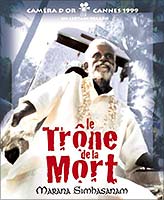| Marana Simhasanam | |
|---|---|
 Film poster at the Cannes festival | |
| Directed by | Murali Nair |
| Written by | Bharathan Njavakkal (dialogue) |
| Screenplay by | Murali Nair |
| Story by | Murali Nair |
| Produced by | Murali Nair |
| Starring | Vishwas Njavakkal Lakshmi Raman Sudhas Thayat Jeevan Mitwa |
| Cinematography | M. J. Radhakrishnan |
| Edited by | Lalitha Krishna |
| Music by | Madhu Apsara |
Release date |
|
Running time | 57 minutes |
| Country | India |
| Language | Malayalam |
Marana Simhasanam (English: Throne of Death, French : Le Trone de la mort) is a 1999 Indian Malayalam-language satire drama film written and directed by Murali Nair. [1] Inspired by the first execution by electrocution in India, the film was screened in the Un Certain Regard section at the 1999 Cannes Film Festival where it won the Caméra d'Or. [2] [3] The film received special reception at the British Film Institute. [4] [5] The film received positive reviews from Le Monde for its unusual theme. The film was screened in Vienna, Turin, Toronto, Busan, La Rochelle, Midnight Sun Film Festival Lapland, and the American Film Institute's Film Festival. [3]